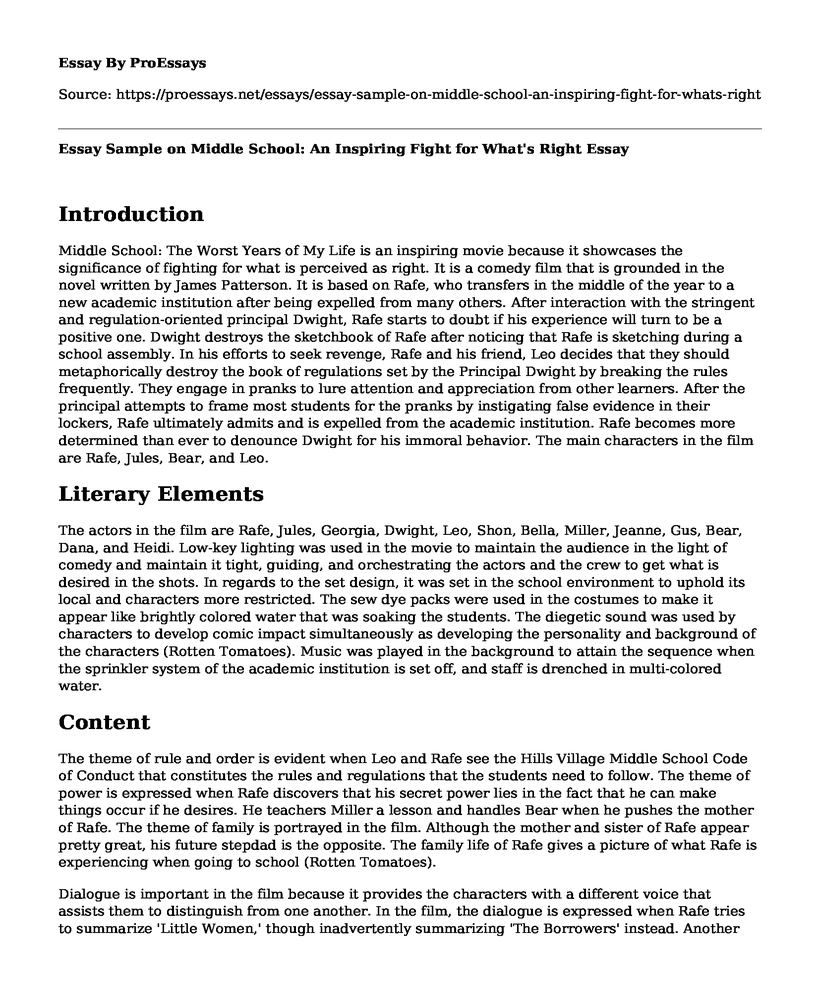Introduction
Middle School: The Worst Years of My Life is an inspiring movie because it showcases the significance of fighting for what is perceived as right. It is a comedy film that is grounded in the novel written by James Patterson. It is based on Rafe, who transfers in the middle of the year to a new academic institution after being expelled from many others. After interaction with the stringent and regulation-oriented principal Dwight, Rafe starts to doubt if his experience will turn to be a positive one. Dwight destroys the sketchbook of Rafe after noticing that Rafe is sketching during a school assembly. In his efforts to seek revenge, Rafe and his friend, Leo decides that they should metaphorically destroy the book of regulations set by the Principal Dwight by breaking the rules frequently. They engage in pranks to lure attention and appreciation from other learners. After the principal attempts to frame most students for the pranks by instigating false evidence in their lockers, Rafe ultimately admits and is expelled from the academic institution. Rafe becomes more determined than ever to denounce Dwight for his immoral behavior. The main characters in the film are Rafe, Jules, Bear, and Leo.
Literary Elements
The actors in the film are Rafe, Jules, Georgia, Dwight, Leo, Shon, Bella, Miller, Jeanne, Gus, Bear, Dana, and Heidi. Low-key lighting was used in the movie to maintain the audience in the light of comedy and maintain it tight, guiding, and orchestrating the actors and the crew to get what is desired in the shots. In regards to the set design, it was set in the school environment to uphold its local and characters more restricted. The sew dye packs were used in the costumes to make it appear like brightly colored water that was soaking the students. The diegetic sound was used by characters to develop comic impact simultaneously as developing the personality and background of the characters (Rotten Tomatoes). Music was played in the background to attain the sequence when the sprinkler system of the academic institution is set off, and staff is drenched in multi-colored water.
Content
The theme of rule and order is evident when Leo and Rafe see the Hills Village Middle School Code of Conduct that constitutes the rules and regulations that the students need to follow. The theme of power is expressed when Rafe discovers that his secret power lies in the fact that he can make things occur if he desires. He teachers Miller a lesson and handles Bear when he pushes the mother of Rafe. The theme of family is portrayed in the film. Although the mother and sister of Rafe appear pretty great, his future stepdad is the opposite. The family life of Rafe gives a picture of what Rafe is experiencing when going to school (Rotten Tomatoes).
Dialogue is important in the film because it provides the characters with a different voice that assists them to distinguish from one another. In the film, the dialogue is expressed when Rafe tries to summarize 'Little Women,' though inadvertently summarizing 'The Borrowers' instead. Another instance of dialogue is demonstrated when Rafe casually tells Jeanne regarding Leo.
Characters in the film can feel quite archetypal though suitable to the genre. Rafe is the most developed character because he overcomes the ridiculous rules set by Principal Dwight, whereas learning to grow and not often delve into his imagination for comfort. It is a proper arch that is characterized by emotional periods, including understanding that Leo is his dead brother and that his approval that Leo is gone assists his shift away from his fantasy world (Rotten Tomatoes). This arch can be useful for the protagonist because there might be notes on tone.
The Larger Picture
The film did not connect well with the original story. Minor details from the book are altered for the film and entirely ruin the adaptation. Various minor aspects were changed, and I feel that it changed how one looks at the film. Characters were not the equivalent because some of them were got rid of. There were surprises that I did not expect. In the book, Leo died due to meningitis when Rafe and he were toddlers. In the film, they articulate that Leo had died nearly a year before from cancer. In the film, Rafe thinks of a brother like this via his imagination. In the film, Rafe has seen mourning. I perceive that Leo is not a similar character in the film he is in the book (Rotten Tomatoes).
Conclusion
Middle School: The Worst Years of My Life is comical throughout the scenes. Arguably, it does not boast of the best originality of storytelling though the movie is appreciative of its exaggeration and hyperbole that it is easy to overwhelm the film for its zany antics and inspired performances by the cast. I would recommend the film to children above 9 years to watch it.
Work Cited
Rotten Tomatoes. "Middle School: The Worst Years of My Life (2016)." Rotten Tomatoes, n.d, www.rottentomatoes.com/m/middle_school_the_worst_years_of_my_life. Accessed 8 Apr. 2020.
Cite this page
Essay Sample on Middle School: An Inspiring Fight for What's Right. (2023, May 07). Retrieved from https://proessays.net/essays/essay-sample-on-middle-school-an-inspiring-fight-for-whats-right
If you are the original author of this essay and no longer wish to have it published on the ProEssays website, please click below to request its removal:
- Family Conflict in Empire (2015 TV Series) Essay
- Poetry Essay Example
- Essay Sample on Rethinking Modernism
- Media Exposure and Violent Crimes - Essay Sample
- Movie Analysis Essay on Casablanca
- Film Analysis Essay on Sling Blade: A Serious Movie by Billy Bob Thornton
- Essay Sample on Evolution of Poetry Through the Centuries







